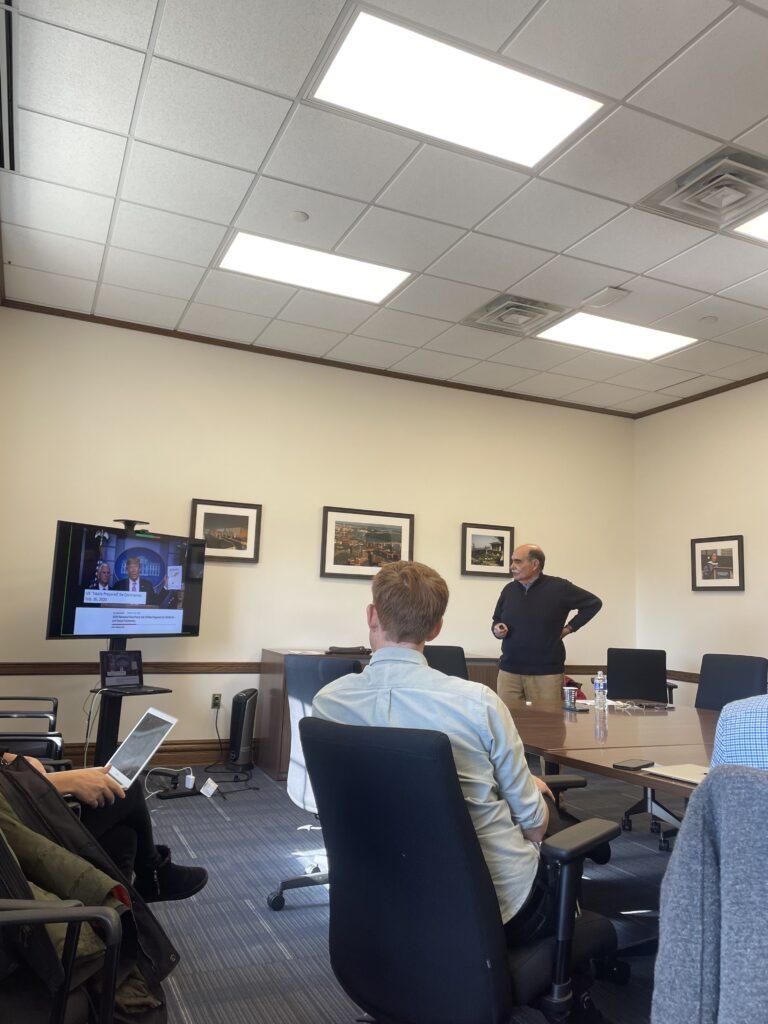Georgetown University department of health management and policy professor Michael Stoto discussed his recent work regarding measuring and assessing public health emergency preparedness at an on-campus seminar Nov. 27.
The event, which was part of the Global Health Security Seminars series, assessed public health systems’ preparedness for infectious disease-related emergencies in the wake of the COVID-19 pandemic, with a focus on the European Centre for Disease Prevention and Control (ECDC).
Stoto, a professor emeritus of health systems administration and population health at Georgetown, has focused his research on surveillance and data systems in public health policy and practice since the outset of the COVID-19 pandemic. In addition to his work at Georgetown, he currently works with the ECDC and the University of Bologna in Italy on assessing public health emergency capabilities during the pandemic, with an upcoming ECDC report written by Stoto highlighting his findings.
Stoto began the seminar by discussing what it means for a country to be adequately prepared for community health disasters, highlighting resilience as a measure of preparedness, governance and trust.
“Preparedness matters, but it’s not by itself enough. What we really need is good governance to actuate these systems, and this level of trust, so that people essentially go along with it,” Stoto said at the event. “Governance eats preparedness for breakfast when it comes to resilience.”
Before the height of the pandemic, many governments and health systems insisted they were prepared for the onslaught of the disease, only to find themselves overwhelmed, according to Stoto. Additionally, many indices, such as the Global Health Security Index (GHSI), failed to predict COVID-19, suggesting that they may need reassessment. However, Stoto’s work did find the GHSI to be a good measure of resilience when adjusted for government capability and age factors.

emergency preparedness on Nov. 27, as part of the Global Health Security Seminars series.
Stoto went on to discuss measurements of system resilience and assessment as well as methods in approaching epidemiology, emphasizing the theoretical approach the ECDC takes.
“Focusing on the capabilities, what the system can do and the objectives you’re trying to achieve, they come in detection and assessment, policy development, adaptation and implementation, health services and then two more: coordination and communication within the public health system, and emergency risk communication with the public,” he said.
Stoto said population-based medicine, a preventative tool where the patient is placed in the context of the larger community, is a necessary measure of preparedness for future public health emergencies. The implementation of population-based medicine better coordinates research so patients can quickly and effectively receive needed hospital care.
“You want to coordinate public health, primary care and advanced care hospital care within a geographical area,” Stoto said. “You can keep people in the hospital until they need it, but then get them into the hospital quickly, and that was something that was difficult to do.”
In the report, the ECDC requires that countries outline how they plan to hold each other accountable in community health emergency preparedness, and the ECDC must conduct visits to EU member states every three years for systems improvement.
Stoto, the ECDC and the University of Bologna also recommended the implementation of stress tests to gauge disaster preparedness and public health service coordination in EU member states.
Stoto said implementing these recommendations is essential to upholding a standardized level of health system emergency preparedness within the EU.
“I think what Article 8 calls for is: ‘Do you have the systems in place?’ Recognizing that’s not the only thing that leads to good outcomes but that it’s an essential component — and that’s appropriate for one country to hold another country accountable,” Stoto said.
Stoto emphasized that while accountability mechanisms go a long way in preparing countries for future public health emergencies, they are only one piece of the puzzle.
“Accountability mechanisms can only go so far, but holding it up to the light is actually a pretty strong one,” Stoto said, referring to the ECDC’s new power to examine countries’ health systems and make recommendations based on their assessments.




















